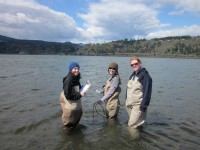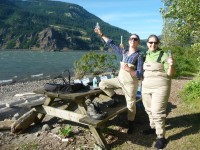Blog post by Lorri Epstein, Riverkeeper’s Water Quality Director—
While pulling on waders and boots local middle school teacher, Adam Smith, had a good chuckle at the dowdy appearance of the waterproof gear he was donning to sample water quality at the Hood River Waterfront Park. Smith is one of Riverkeeper’s 96 volunteers who monitor the health of our rivers.

Since 2006, Riverkeeper volunteers have monitored sites in Oregon and Washington, collecting valuable water quality data. From teachers to students to local water enthusiasts, Riverkeeper trains volunteers to use water quality monitoring equipment and collect data throughout the Columbia River Basin.
In early January, Riverkeeper submitted 2013 water quality data to the Oregon Department of Environmental Quality (DEQ) from 62 sites on the Columbia River and tributaries. Fifty-two of the sites monitored (84%) had at least one violation of the state water quality standards. The state of Oregon will use this data in their statewide assessments of whether water bodies are meeting safety limits for swimming, fishing, and threatened salmon species.
Our high-quality, volunteer-collected data is filling critical data gaps and creating a robust data set of water quality along the Columbia and its tributaries. This kind of on-going monitoring is critical to understanding the health of the river and to ensuring a rapid response when problems arise. By building this dataset, and continuing it over time, we provide critical ecological insight at a scale that is relevant to river managers and will support evidence-based policy and decision-making. It’s also a great excuse to spend some time on the river.
Steve Hanson from Oregon DEQ recognized Riverkeeper’s contribution stating, “The Riverkeeper program has developed into a high-quality monitoring program that links a large number of volunteers together over a long stretch of the river. That in itself is valuable, but the volunteers also do an excellent job of documenting the quality of the data they collect thereby providing useful data at a resolution the DEQ would never be able achieve alone. Some of this data has already identified opportunities to improve water quality.”
Our volunteers take ownership over key sections of the river, and work to restore the river stretch by stretch, by testing water quality, reporting pollution, and removing contamination, trash, and invasive species.
Thanks to all the volunteers to contributed their time and energy to help ensure a clean Columbia!



